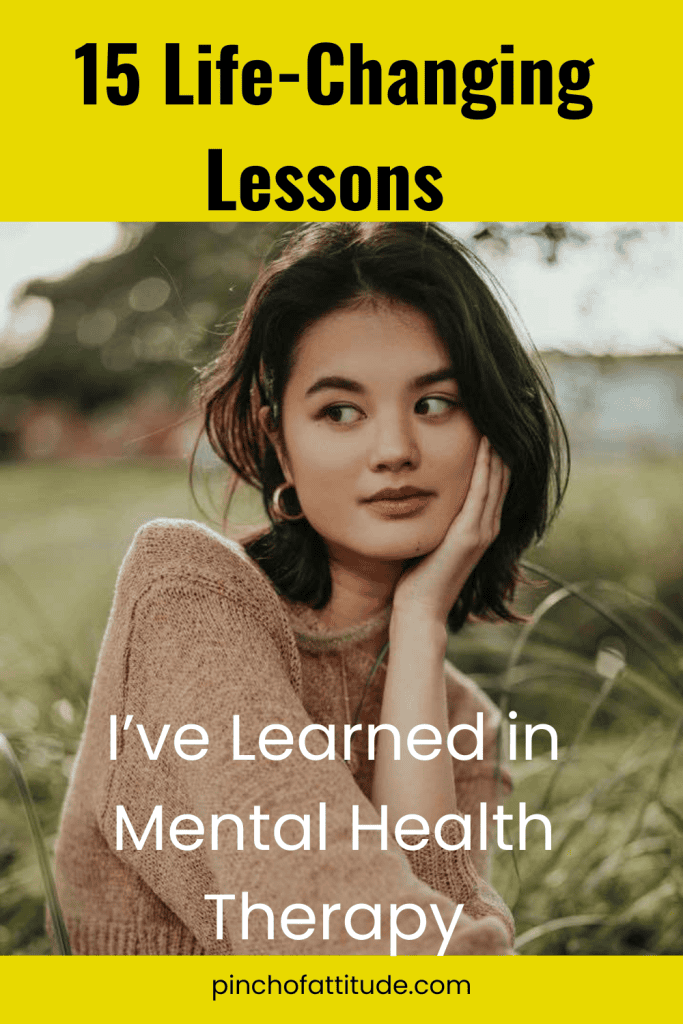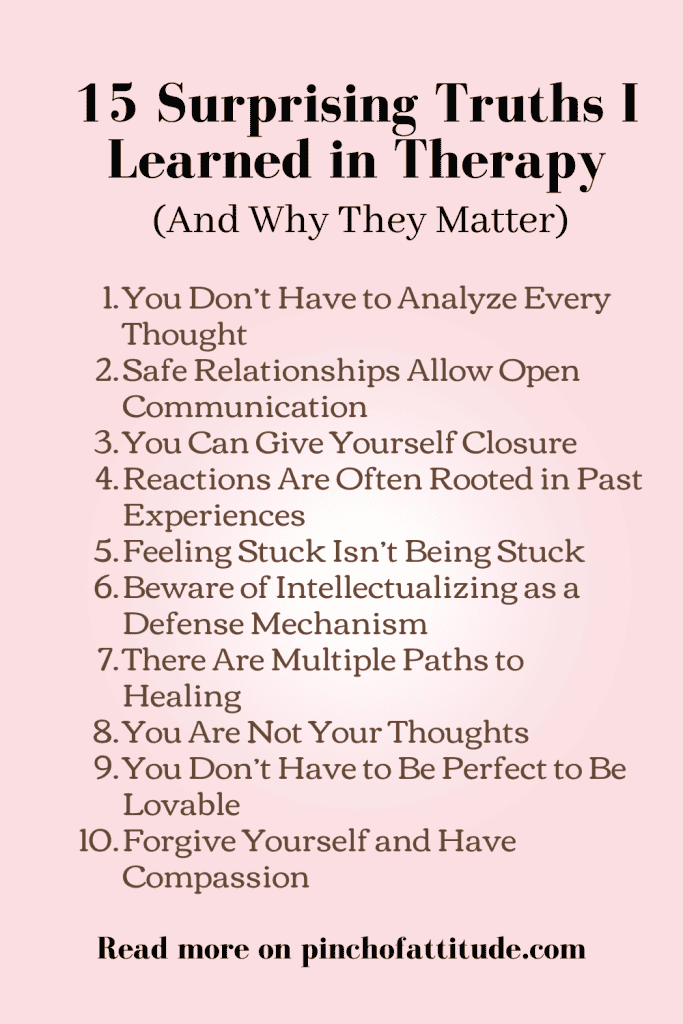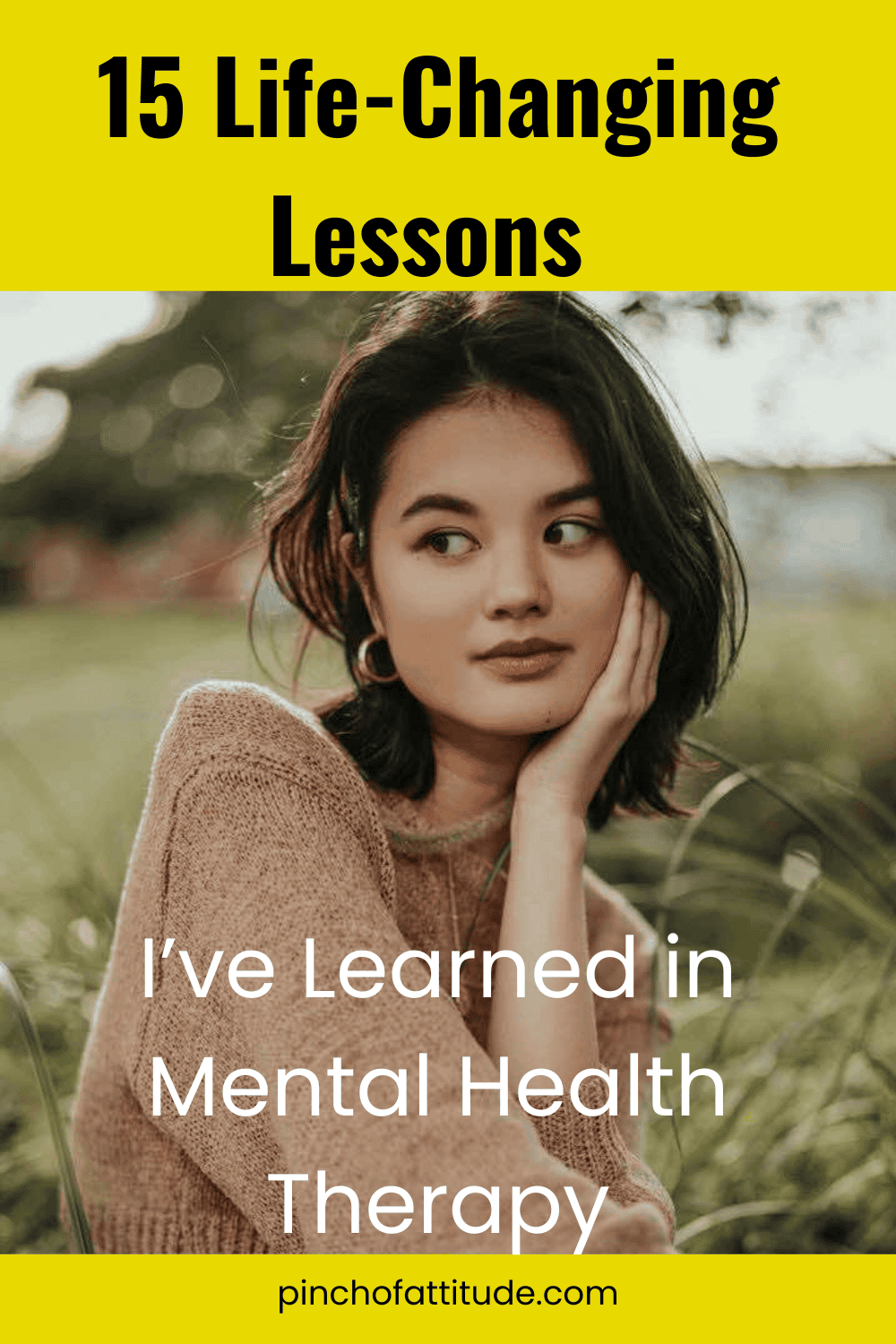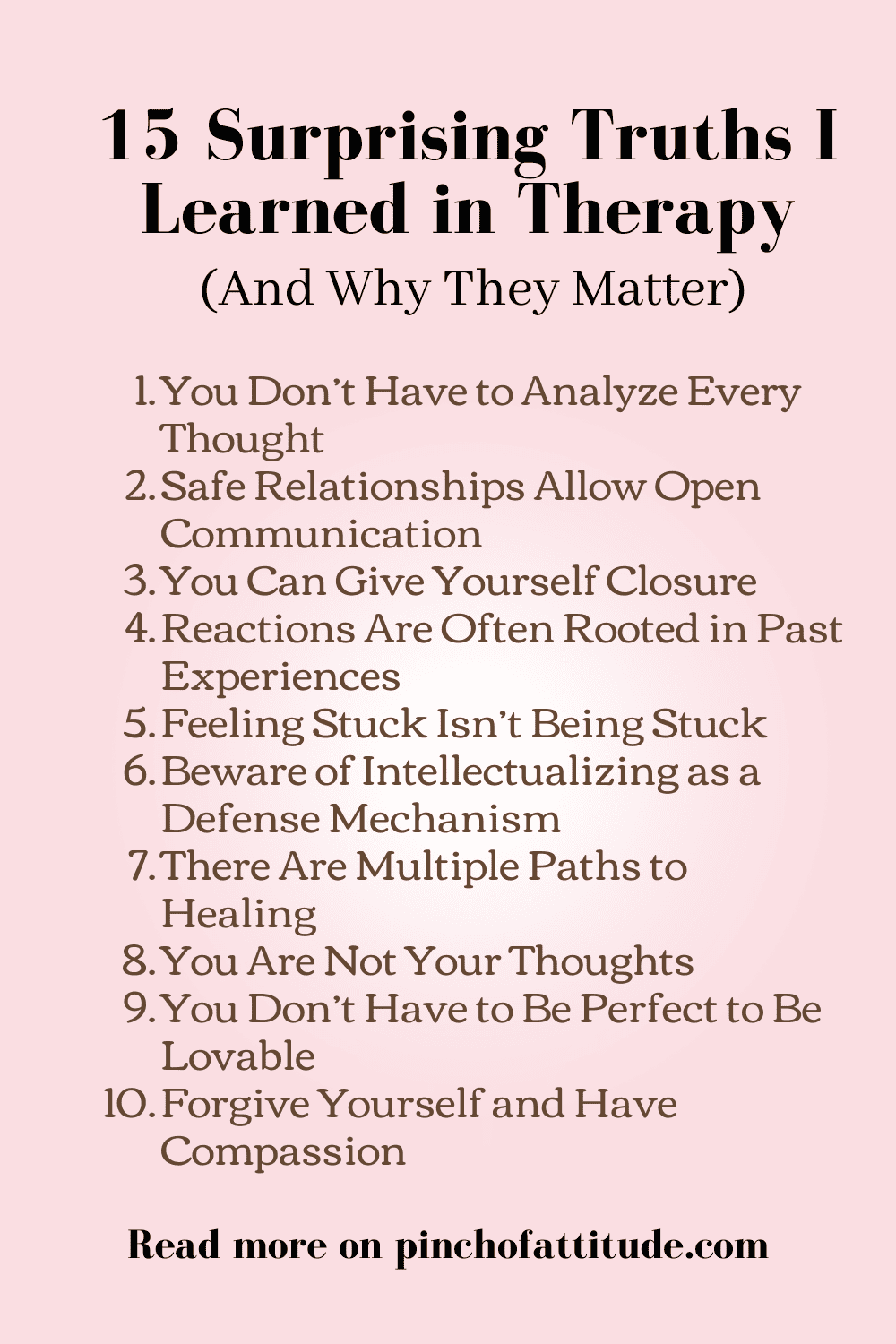Therapy.
The word itself can conjure up images of lying on a couch, spilling your guts to a silent, bearded figure with a notebook.
But in reality, therapy is a journey of self-discovery, growth, and occasional awkward silences.
I’ve spent my fair share of hours in that room, and here are 15 things I’ve learned that might just make you want to give it a try—or at least laugh at my expense.
- Therapy teaches the importance of self-compassion and forgiving oneself, recognizing that imperfection is a universal human experience.
- Safe relationships are built on open communication and effective conflict resolution, not the avoidance of conflict.
- You don’t have to analyze every thought or be perfect to be lovable; being authentic and listening to your body’s signals are crucial for personal growth and well-being.
Table of Contents
1. You Don’t Have to Analyze Every Thought

One of the first things I realized in therapy is that not every thought needs to be dissected or solved. Our minds can be chaotic places, and sometimes it’s okay to just let thoughts pass without dissecting them.
Learning to observe without immediate reaction can bring a sense of peace and clarity. This mindfulness practice can prevent overthinking and reduce anxiety, helping you to focus on what truly matters at the moment.
By letting go of the need to solve every problem right away, you give yourself the space to process emotions more naturally and find balance.
2. Safe Relationships Allow Open Communication

A key lesson from therapy is that true safety in relationships comes from being able to express your concerns and needs without fearing retaliation or punishment.
Therapy helped me understand that true safety in relationships comes from mutual respect and the freedom to express oneself honestly. It’s about creating a supportive environment where both parties feel heard and valued, leading to deeper and more meaningful connections.
When you feel secure enough to voice your feelings and needs without fear of backlash, it nurtures trust and intimacy, which are the foundations of healthy relationships.
3. You Can Give Yourself Closure
I learned that waiting for someone else to provide closure is often fruitless; you have the power to give it to yourself.
Therapy taught me that I can give myself the closure I need. It’s about finding peace within and moving forward, regardless of unresolved issues with others.
This involves acknowledging your feelings, understanding your own needs, and deciding to let go of what you can’t control. It’s empowering to realize that closure is something you create for yourself.
By practicing self-compassion and allowing yourself to heal, you reclaim your power and open the door to new beginnings.
4. Reactions Are Often Rooted in Past Experiences

Through therapy, I discovered that many of our reactions are tied to past experiences rather than the current situation. Being mindful of this can improve your interactions with others.
Therapy helped me identify these patterns and respond more appropriately to the present situation. Recognizing these triggers allows you to break free from past influences and engage with the present more effectively.
By understanding the origins of your reactions, you can respond with greater awareness and create healthier, more constructive relationships.
5. Feeling Stuck Isn’t Being Stuck
Therapy taught me that feeling stuck is not the same as being stuck; you always have the power to make changes.
It gave me the tools to recognize my agency and make changes, even when I felt immobilized by circumstances. It’s about shifting your mindset from helplessness to empowerment and taking small steps towards your goals.
Remember, progress is progress, no matter how slow. Every small action counts, and by focusing on what you can control, you can gradually move forward and create positive change in your life.
6. Beware of Intellectualizing as a Defense Mechanism
A significant insight from therapy was recognizing that overthinking can sometimes be a way to avoid dealing with emotions.
It helped me realize that sometimes, overthinking is just a way to dodge the tough stuff. Feelings need to be felt, not just understood. By allowing yourself to experience your emotions fully, you can process and move through them more effectively.
Intellectualizing can be a way to keep painful feelings at bay, but true healing requires embracing and working through those emotions.
7. There Are Multiple Paths to Healing
Therapy opened my eyes to the fact that there are various ways to heal, and it’s important to find what works best for you. It encouraged me to explore different healing methods and find what truly resonates with me, rather than following a prescribed path.
Whether it’s meditation, journaling, exercise, or creative expression, what matters is finding what works best for you.
Healing is a personal journey, and it’s important to honor your unique needs and preferences as you seek out the methods that bring you the most peace and fulfillment.
8. You Are Not Your Thoughts

Therapy helped me understand that my thoughts do not define who I am; it’s my actions and choices that truly matter. It helped me differentiate between my thoughts and my actions, empowering me to make conscious choices aligned with my values.
By recognizing that thoughts are just thoughts, not absolute truths, you can gain control over your actions and decisions.
This understanding helps in reducing self-judgment and allows you to focus on positive behaviors that reflect your true self and your core values.
9. You Don’t Have to Be Perfect to Be Lovable
A valuable lesson from therapy is that you don’t need to be flawless to be loved; authenticity is key. It taught me that authenticity and vulnerability are what create genuine connections, not a facade of perfection.
Embracing your imperfections and being your true self allows others to see and appreciate the real you, fostering deeper and more meaningful relationships.
By letting go of the pressure to be perfect, you open yourself up to more authentic and rewarding interactions where you can be truly seen and loved for who you are.
10. Forgive Yourself and Have Compassion
Therapy reinforced the importance of self-forgiveness and compassion as essential components of personal growth. It helped me see that self-compassion is crucial for personal growth.
It’s okay to be kind to yourself while striving to be better. By acknowledging your mistakes and learning from them, you can move forward with a healthier mindset.
Self-forgiveness releases you from the burden of guilt and allows you to focus on growth and self-improvement with a more positive and nurturing attitude.
11. How We Repair After Conflict Matters

I learned that the way we handle and mend conflicts is crucial to building emotional security and trust. Therapy provided tools for effective conflict resolution and rebuilding trust. It’s in these moments of repair that relationships strengthen and deepen.
By addressing conflicts openly and constructively, you can foster a sense of safety and trust that makes your relationships more resilient and supportive.
12. It’s Not Your Job to Fix Other Adults
Therapy highlighted the importance of recognizing that it’s not your responsibility to fix or parent other adults. It emphasizes the importance of letting others take responsibility for their actions while focusing on your own growth and boundaries.
By setting these boundaries, you allow others the space to grow and learn on their own. It’s about recognizing that everyone has their own path and respecting their autonomy, while also protecting your own well-being and energy.
13. Being Human Means Struggling

A significant takeaway from therapy is that struggling is a natural part of being human, not a sign of being flawed or broken.
Therapy helped normalize my struggles, showing me that imperfection is a universal human experience. Accepting this can reduce the pressure you put on yourself and increase your self-compassion.
By understanding that everyone has challenges and imperfections, you can cultivate a kinder and more forgiving attitude towards yourself and others, fostering a more compassionate and supportive outlook on life.
14. Listen to Your Body
Therapy taught me to pay attention to my body’s signals as they often provide important insights into my emotional and physical well-being. It emphasized the importance of listening to my body’s signals and recognizing them as important feedback about my emotional and physical well-being.
Whether it’s stress, fatigue, or anxiety, your body often signals what you need before your mind does. By tuning into these signals, you can take proactive steps to care for yourself and address your needs, leading to a more balanced and healthy life.
15. Acknowledging Injustice Doesn’t Mean Powerlessness

Perfection is an illusion. Therapy taught me to embrace my imperfections and see them as part of what makes me unique.
Striving for perfection is exhausting; embracing your flaws is liberating.
We often put pressure on ourselves to be perfect, leading to stress and self-criticism. Therapy helps you recognize that imperfections are a natural part of being human.
Accept your flaws to cultivate self-compassion and focus on what truly matters. Remember, it’s your imperfections that make you relatable and authentic.
Related Posts:
Frequently Asked Questions
What is the most important lesson you learned in therapy?
The most important lesson I learned in therapy is that it’s okay to not have all the answers and to embrace uncertainty.
How did therapy help with setting boundaries?
Therapy taught me that setting boundaries is essential for protecting my peace and maintaining healthy relationships.
Why is open communication important in relationships?
Open communication is important because it builds trust and allows for effective conflict resolution, strengthening emotional security.
How can listening to your body improve your well-being?
Listening to your body can improve your well-being by helping you recognize and address your emotional and physical needs before they escalate.
What does therapy say about the need to be perfect?
Therapy teaches that you don’t need to be perfect to be lovable; authenticity and self-acceptance are key to building meaningful connections.




